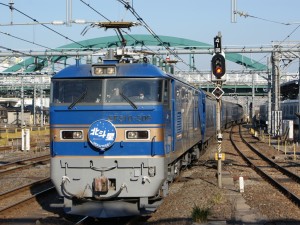マイケルズイングリッシュスクール英会話 大阪天王寺 毎週の単語レッスン
\’Blue train\’ ends last run after nearly 60 years\’ service
「北斗星」運行終了、ブルートレインの歴史に幕

An era came to an end Aug. 23 when Japan\’s last \”blue train\” (long-distance sleeper train) completed its final run nearly 60 years after the train\’s debut in 1958.
The Hokutosei express train left Sapporo Station in Hokkaido for the last time Aug. 22, arriving at Ueno Station in Tokyo the following morning as train enthusiasts and onlookers cheered.
The Hokutosei express, which has individual cabins and a luxurious dining car, ended regular operations in March and has been operating an occasional service between Ueno and Sapporo.
Blue trains used to provide popular overnight long distance services in Japan, connecting urban areas and the countryside, but the number of passengers declined as shinkansen bullet trains became faster with the growth of domestic air routes.
nearly – 約・era – 時代・ came … end – 終わった・sleeper train – 寝台列車・completed – 〜うぃ終えた・train enthusiasts – 鉄道ファン・onlookers 見物人・individual cabins – 個室・ occasional – 不定期の・ provide – 〜を提供する・urban areas – 都市部・ passengers – 乗車・ declined 減少した・with … of – 〜の成長に伴い・luxurious – 豪華な・domestic air routes – 国内航空路線
If you\’re interested in learning vocabulary through news and current affairs, check back every Saturday for another article!
The aim of the articles is to be short enough to easily digest, whilst still providing some important new words. Furthermore, we deliberately choose topics that you\’ve probably heard in the news already – which makes them relatable and easier to understand. Could you tell your teacher about this news story, in English? Try to practice recounting the story, or even rewriting it in your own words. Afterwards, you can show it to your teacher for correction. Additionally, you could also try a translation of the article. This is an intellectually stimulating exercise which is both fun and great practice for understanding the different ways of thinking between English and Japanese. Finally, please remember to have fun learning English! The most rewarding thing for us at Michael\’s English School is seeing your results. See you next time!

